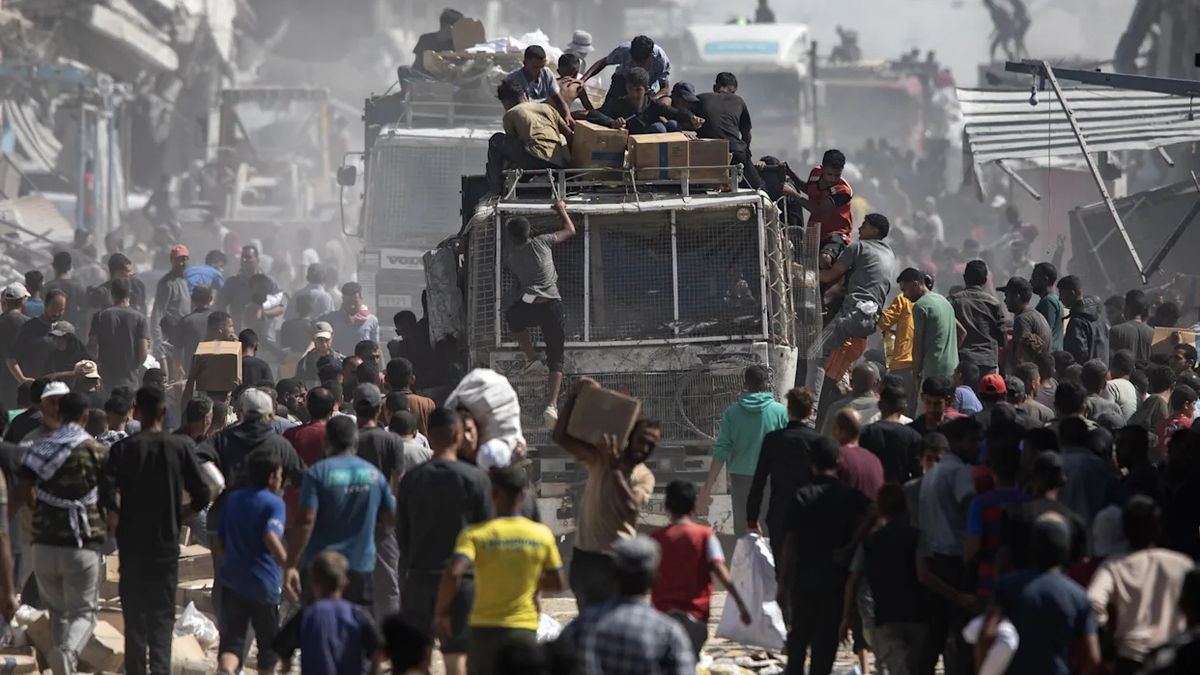“Global challenges” is one theme of the economic forum in Riyadh. It quickly becomes clear that the conference is primarily turning into a crisis meeting about the Gaza war – the chances of success are unclear.
With high-level diplomacy in Riyadh and parallel talks in Cairo, mediators have launched a new attempt to negotiate a ceasefire in the Gaza war and avert a major Israeli offensive on the city of Rafah. According to British Foreign Minister David Cameron, Hamas was presented with a proposal for a 40-day ceasefire on Monday. Accordingly, “potentially thousands” of Palestinians should be released from Israeli prisons in return for the release of hostages held by Hamas, Cameron said on Monday in Riyadh at a World Economic Forum (WEF) conference.
“I hope that Hamas accepts this deal,” Cameron said. All pressure worldwide and “all eyes” should now be on Hamas. US Secretary of State Antony Blinken said Israel had made a “very, very generous” proposal. The only thing separating the people of Gaza from a ceasefire now is Hamas. Hamas “has to decide and it has to decide quickly,” said Blinken. A Hamas delegation arrived in Cairo on Monday to negotiate the latest proposal.
Israeli media had previously reported that this proposal included the release of 33 hostages held by Hamas. In return, Israel intends to release several hundred Palestinian prisoners from prison. Among them are women, including soldiers, older people, the injured and the “mentally impaired.” According to reports, the length of the ceasefire should depend on the number of hostages released. Israel would therefore also withdraw from a central road that divides the Gaza Strip into north and south. Residents of the northern section are also allowed to return to their homes. A large majority of the approximately 2.2 million inhabitants of the Gaza Strip fled to the south during the war.
New Israeli attacks in Rafah
The outcome of the negotiations will also determine the extent to which Israel will continue its attacks in the city of Rafah in the south of the Gaza Strip and expand it into a large-scale offensive. Despite repeated warnings from allies about hundreds of thousands of internally displaced people in the city, Israel wants to destroy the remaining Hamas battalions there. New Israeli strikes in Rafah have killed at least 27 Palestinians, according to the Hamas-controlled health authority. The information could not be independently verified.
In connection with the negotiations in Cairo and the fighting in Rafah, there was speculation that Israeli Prime Minister Benjamin Netanyahu might have to choose between a hostage deal and the continued existence of his government. Israel’s right-wing extremist Finance Minister Bezalel Smotrich threatened on Sunday to end the government if the current hostage deal was implemented and a military operation in Rafah was stopped. Netanyahu’s political survival depends on his far-right coalition partners.
In Riyadh on Monday, on the sidelines of the WEF conference, several foreign ministers from Western and Arab countries were scheduled to discuss the conflict – according to diplomatic circles, in a 5+5 format. In addition to Blinken, Federal Foreign Minister Annalena Baerbock and her counterparts from Egypt, Jordan and Saudi Arabia should take part. The WEF conference was actually about environmental, health and financial issues, but was largely dominated by the Gaza war and its impact on the region.
Fighting also continued on Monday on Israel’s northern border with Lebanon. The Qassam Brigades, the military wing of Hamas, claimed responsibility for an attack with numerous rockets on a military camp near the border town of Kiriat Shmona. There were no reports of injuries or property damage. Israeli media reported that most of the approximately 20 projectiles were intercepted by the missile defense system. The rest hit uninhabited areas. During the night, Israel said it had shelled targets belonging to the Shiite militia Hezbollah in the south of Lebanon.
Source: Stern
I have been working in the news industry for over 6 years, first as a reporter and now as an editor. I have covered politics extensively, and my work has appeared in major newspapers and online news outlets around the world. In addition to my writing, I also contribute regularly to 24 Hours World.




